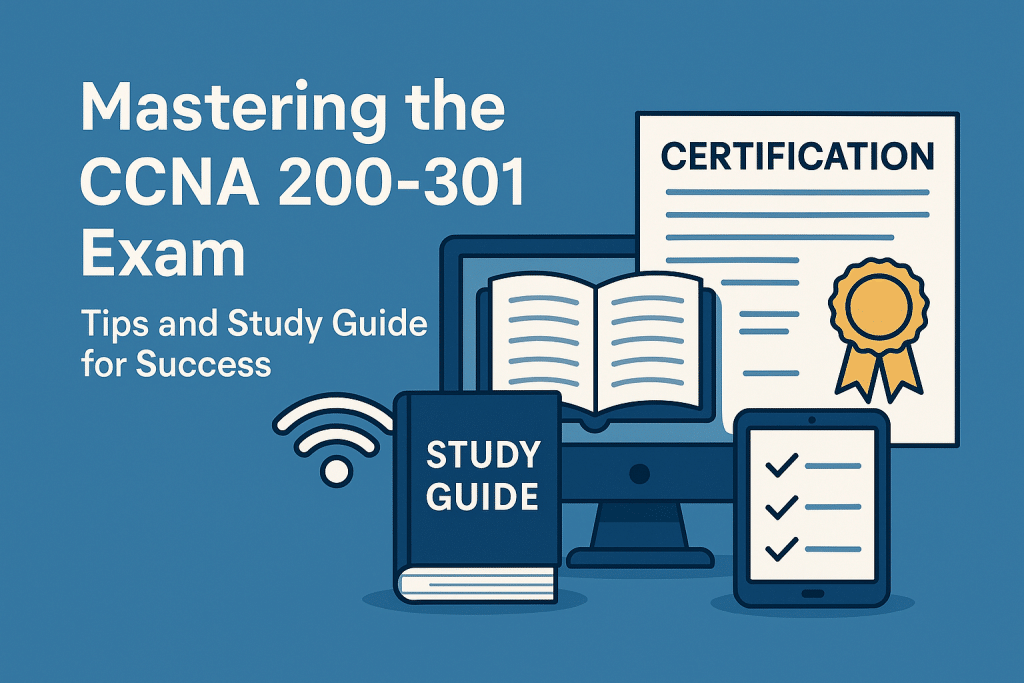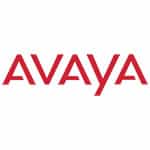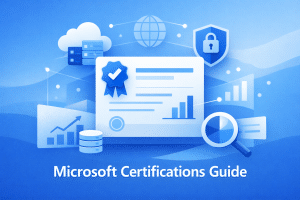If you want to start a career in networking, the CCNA 200-301 certification is one of the best places to begin. Offered by Cisco, this certification tests your knowledge of networking fundamentals, security, automation, and more. Whether you’re a beginner or already have some IT experience, passing the CCNA exam can open doors to great job opportunities.
But before you jump into preparation, it’s important to understand what the exam covers, how it works, and what you need to do to pass. Let’s understand everything, exam format, syllabus, cost, difficulty level, study tips, and more, to help you succeed in your CCNA 200-301 exam prep.
Breaking Down the CCNA 200-301 Exam Syllabus
CCNA 200-301 Exam Syllabus — Domains & Key Skills
| Domain | Weight | Key Skills Tested |
|---|---|---|
| Network Fundamentals | 20% | IP addressing, subnetting & CIDR, OSI model, cables & interfaces, IPv4 vs IPv6. |
| Network Access | 20% | VLANs & trunking, STP, wireless concepts (SSIDs, encryption, standards). |
| IP Connectivity | 25% | Static & default routes, OSPF configuration & troubleshooting, routing logic. |
| IP Services | 10% | DHCP, NAT, NTP, DNS functionality. |
| Security Fundamentals | 15% | Firewalls, VPNs, ACLs, basic threat defense concepts. |
| Automation & Programmability | 10% | Intro to APIs, JSON & Python basics, software-defined networking concepts. |
| Tip Simulation practice (Packet Tracer, GNS3) is vital — many candidates struggle with subnetting, OSPF troubleshooting, ACL logic, and automation basics under exam pressure. |
||
Cisco doesn’t throw random questions at you. The CCNA 200-301 exam follows a structured syllabus covering key areas of networking. Knowing what’s inside can help you plan your study sessions better and avoid surprises on exam day.
What’s Covered in the CCNA 200-301?
The exam focuses on core networking topics, but Cisco also wants you to understand security, automation, and wireless concepts. Here’s a rough breakdown of what you’ll see:
- Network Fundamentals (20%) – Covers basics like IP addressing, subnetting, cables, and how data moves across a network.
- Network Access (20%) – VLANs, trunking, spanning tree protocol (STP), and wireless concepts fall here.
- IP Connectivity (25%) – This is routing, including how packets find their way using OSPF, static routes, and default routes.
- IP Services (10%) – DHCP, NAT, and NTP – these services keep networks running smoothly.
- Security Fundamentals (15%) – Cisco expects you to know firewalls, VPNs, and access control lists (ACLs).
- Automation and Programmability (10%) – This is Cisco’s push toward software-defined networking (SDN). Basic Python, JSON, and APIs come into play here.
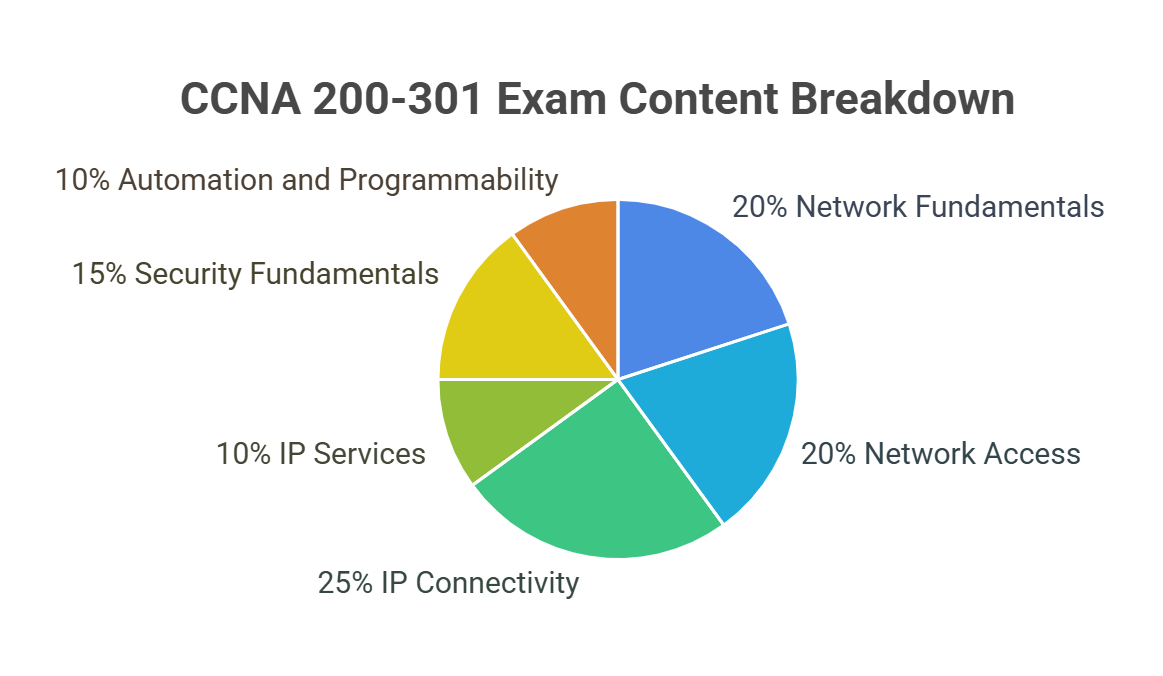
Networking Concepts You Need to Master
Some of the skills related to these topics are easier to grasp than others. Here’s a list of the most important ones you must understand to pass:
- Subnetting & CIDR Notation – You’ll lose precious time if you can’t subnet quickly.
- VLANs & Trunking – Know how to segment a network properly.
- OSPF Routing – Cisco’s go-to protocol for CCNA-level exams.
- Access Control Lists (ACLs) – Blocking or allowing traffic based on rules.
- NAT (Network Address Translation) – Translating private IPs to public IPs.
- Wireless Basics – SSIDs, encryption, and common wireless standards.
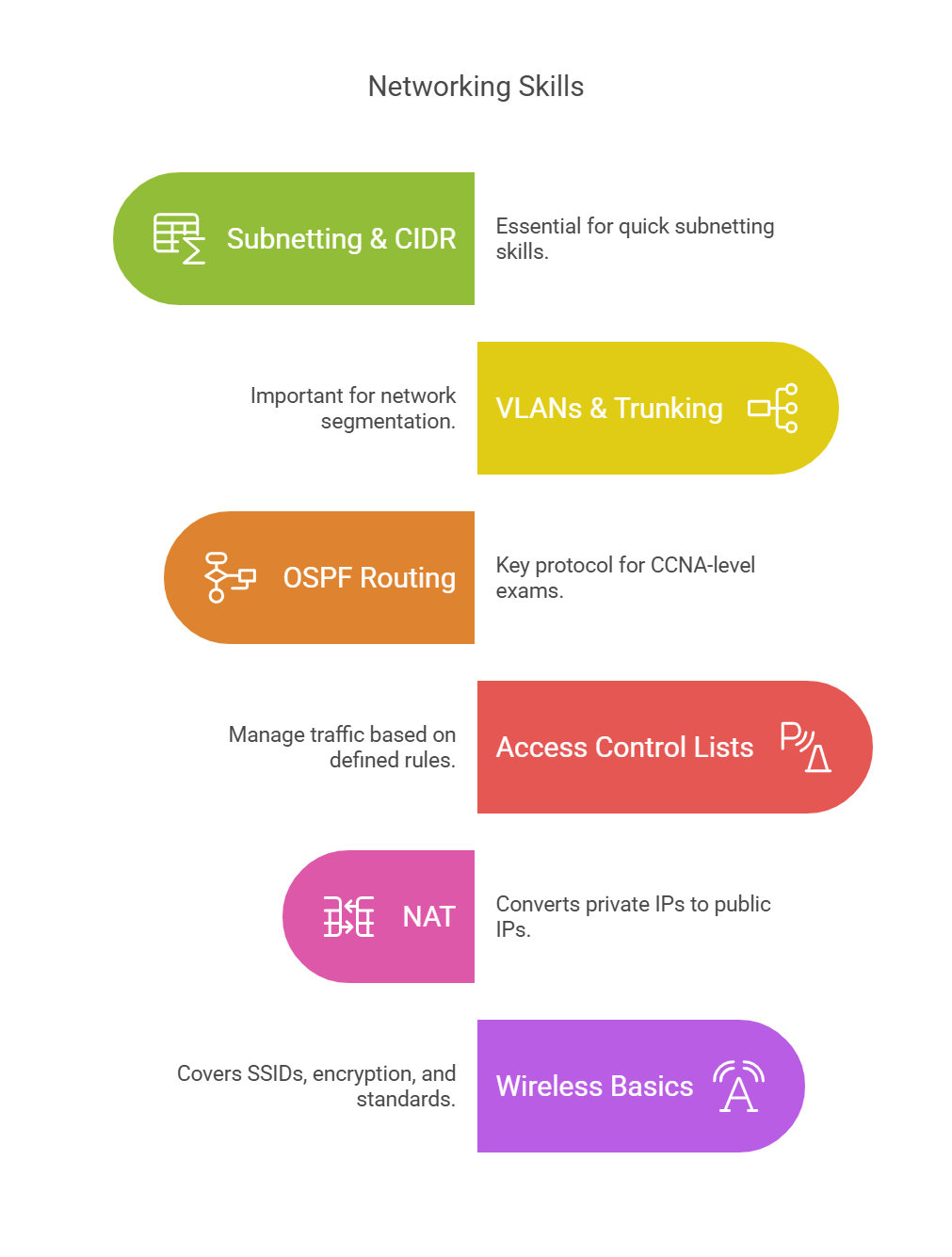
Where Test-Takers Struggle
Some topics trip people up more than others. These are common problem areas:
- Subnetting Under Pressure – Doing subnet calculations at home is easy. But when the clock is ticking? That’s another story.
- OSPF Troubleshooting – You’ll need to fix misconfigurations, not just understand theory.
- Automation & APIs – Many CCNA candidates aren’t comfortable with coding, so JSON and Python questions can be tricky.
- ACL Logic – Writing access control rules is easy. Understanding how they’re processed (top-down, first match) takes practice.
Understanding the Exam Format: What to Expect on Test Day
Walking into the exam without knowing the question types is like playing a game without reading the rules. Here’s what you’ll face:
Types of Questions You’ll Encounter
- Multiple Choice – The usual, but Cisco sometimes makes all answers look right.
- Drag-and-Drop – Matching concepts to definitions or placing steps in order.
- Simulation Questions – These test real-world skills. You might need to configure a router or fix a broken network setup.
- Simlets & Testlets – These combine multiple-choice questions with simulations, so you have to answer based on a scenario.
How Cisco Tests Practical Skills
This isn’t just a theory-based exam. Cisco expects you to apply what you’ve learned in realistic networking scenarios. That means configuring routers, troubleshooting VLANs, and analyzing OSPF behavior.
One tip: Don’t waste time trying to memorize configurations. You must understand why things work the way they do.
Scoring System & Passing Criteria
Cisco doesn’t reveal exact scores, but most sources estimate that you need around 825-850 out of 1000 to pass. Each question carries a different weight, so it’s not just about answering a certain number correctly, it depends on the difficulty of those questions.
How Long Is the CCNA 200-301 Exam?
Cisco gives you 120 minutes (2 hours) to complete the test. That may sound like a lot, but once you see the simulation questions, you’ll realize how fast time slips away.
Time Management Tips
- Keep an eye on the clock – Don’t spend too long on a single question.
- Skip & return – If a question is too hard, mark it and move on.
- Practice simulations in advance – These take the most time, so knowing how to configure devices quickly is a huge advantage.
How to Handle Time-Consuming Simulation Questions
Simulations can take 5-10 minutes each if you’re not prepared. Here’s what helps:
- Use shortcuts – In Cisco’s CLI, using Tab for autocomplete and ? for help can save seconds.
- Know basic configurations by heart – Setting up VLANs, OSPF, and ACLs should feel second nature.
- Don’t panic – If a sim is too hard, do what you can and move on.
This part of the exam is where practical experience shines. The more time you spend in Packet Tracer or GNS3, the smoother it’ll be on exam day.
How Difficult Is the CCNA 200-301 Exam?
A lot of people wonder, Is the CCNA really that hard? The short answer: It depends on your background.
Is It Beginner-Friendly, or Do You Need Prior Experience?
If you’re completely new to networking, expect a steep learning curve. The CCNA isn’t an entry-level IT cert like CompTIA A+. It assumes you already know basic networking concepts, things like IP addresses, subnetting, and how routers and switches communicate.
That said, plenty of beginners pass the exam with consistent study and hands-on practice. If you’re starting from zero, give yourself at least 3 to 6 months of study time.
Common Challenges Faced by Test-Takers
Here’s where most people struggle:
- Subnetting Under Pressure – You don’t just need to know subnetting, you need to do it fast. The exam gives you limited time, and subnetting can eat up minutes if you’re not quick.
- Configuring Network Devices in a Simulation – Reading about VLANs and OSPF is one thing. Actually configuring them in a live environment is another. The exam tests real-world skills.
- Tricky Multiple-Choice Questions – Some questions seem to have multiple correct answers. Cisco loves testing your ability to pick the “best” answer rather than just a correct one.
- Memorizing Too Much Instead of Understanding – Rote memorization doesn’t work here. You need to understand how networks operate so you can troubleshoot and apply concepts.
- Automation & Programmability – Many candidates aren’t familiar with APIs, JSON, or Python, but these topics are now part of the syllabus.
How to Make Tough Topics Easier to Understand
The best way to learn is by doing.
- Subnetting – Use tools like subnet calculators for practice, but learn to do it manually.
- Hands-on Labs – Set up a home lab with Cisco Packet Tracer, GNS3, or real hardware.
- Study Groups & Forums – Sometimes, a different explanation makes everything click.
- Practice Tests – Timed quizzes help train your brain to think fast under pressure.
The CCNA isn’t impossible. Thousands of people pass every year, many with no prior experience. If you put in the time and focus on real-world application, you can do it too.
CCNA Certification Validity: How Long Does It Last?
Passing the CCNA feels great, but it doesn’t last forever.
How Often Does the Certification Need Renewal?
Cisco certifications, including the CCNA 200-301, expire every 3 years. If you don’t renew it in time, you’ll lose your certification status, and it won’t appear as “active” on your Cisco profile.
What Happens If Your CCNA Expires?
If you let your CCNA lapse, you’ll have to retake the exam to get certified again. Employers often look for active certs, so keeping it updated is important, especially if you’re job hunting.
Ways to Keep Your Certification Active (Renewal Options)
You don’t have to retake the CCNA every time. Cisco offers multiple ways to renew:
- Pass a higher-level Cisco exam – If you go for CCNP, that will renew your CCNA automatically.
- Earn Continuing Education (CE) credits – Cisco lets you complete training courses or attend events to maintain your cert.
- Retake the CCNA 200-301 – If you prefer, you can just pass the CCNA exam again.
If you’re serious about networking, advancing to CCNP is often a better option than just renewing CCNA over and over.
How Much Does the CCNA 200-301 Exam Cost?
Getting certified isn’t free. Cisco charges $300 USD for the CCNA exam. That’s just the exam fee—study materials, lab access, and training courses are extra.
Registration Fees and Additional Costs
Here’s a breakdown of potential expenses:
- Exam Fee – $300 USD
- Study Materials – Books, courses, and labs can range from $50 to $500
- Practice Tests – Some are free, but premium ones cost around $50-$100
- Lab Equipment (Optional) – If you want real Cisco gear, expect to spend $200+
Are There Discounts for Students or Retakes?
Yes! Cisco offers student discounts through its Cisco Networking Academy. If you’re enrolled in an official Cisco course, you might get a discounted exam voucher.
For retakes, there’s no official discount, but Cisco sometimes runs promotions where you get a second attempt at a lower price.
Where to Find Vouchers or Promotional Offers?
- Cisco Networking Academy – Offers discounted vouchers to students.
- Cisco Learning Network – Sometimes runs promotions or exam bundles.
- Employer-Sponsored Training – Some companies will pay for your exam if it’s job-related.
If you are paying out of pocket, look out for Cisco promotions or training bundles that include the exam voucher at a lower price.
How to Register for the CCNA 200-301 Exam
So, you’re ready to book an exam ready for your CCNA exam? Cisco doesn’t let you just walk into a test center and take it, you need to schedule it in advance. Here’s how:
Step-by-Step Guide to Booking Your Exam
- Create a Pearson VUE Account
- Cisco uses Pearson VUE as its official testing provider.
- Go to Pearson VUE’s Cisco page and create an account if you don’t already have one.
- Select the CCNA 200-301 Exam
- Once logged in, search for Exam Code: 200-301 and select it.
- Choose Your Testing Option
- Decide whether you want to take the exam online or at a physical test center.
- Pick a Date and Time
- Look at the available slots and select one that fits your schedule.
- If choosing an in-person center, pick one close to you for convenience.
- Pay the Exam Fee
- The CCNA exam costs $300 USD (unless you have a discount or voucher).
- Complete the payment and confirm your booking.
- Check Your Confirmation Email
- Pearson VUE will send an email with all details keep this for reference.
Choosing the Right Test Center or Online Proctoring Option
- In-Person Test Center: Best if you prefer a distraction-free environment.
- Online Proctored Exam: Take it from home, but make sure you meet the technical requirements.
What to Do Before Exam Day to Avoid Last-Minute Issues
- Check Your ID – Cisco requires a government-issued ID for verification.
- Run System Tests – If taking it online, use Pearson VUE’s system check tool.
- Prepare Your Exam Space – Online test-takers need a clean, quiet workspace with no unauthorized materials.
- Get a Good Night’s Sleep – Being well-rested improves focus and recall.
What Kind of Questions Appear in the CCNA Exam?
The CCNA 200-301 isn’t just a bunch of multiple-choice questions. Cisco mixes in different question styles to test both theoretical knowledge and practical skills.
A Breakdown of Question Styles: Theory vs. Practical
- Multiple Choice – Can be single-answer or multiple answers. Some are tricky!
- Drag-and-Drop – You might have to match networking terms with their functions.
- Simulations (Labs) – You’ll configure a network device just like in real life.
- Simlets – These combine multiple-choice questions with a simulated environment.
- Testlets – A scenario-based question with multiple related queries.
How to Approach Tricky Multiple-Choice Questions
- Eliminate Obvious Wrong Answers – Most MCQs have one or two answers that are clearly wrong.
- Watch Out for ‘Best’ Answer Traps – Sometimes, multiple answers look correct, but Cisco wants the best choice.
- Think Like a Network Engineer – Don’t just recall facts—apply logic to real-world situations.
Common Mistakes That Cost Points (And How to Avoid Them)
- Rushing Through Simulations – Take your time! Sim questions hold a lot of weight.
- Skipping Practice Labs – If you haven’t configured a router or switch before, you’ll struggle.
- Ignoring Automation Topics – APIs and Python might seem minor, but they do appear on the test.
- Poor Time Management – Spending too long on one question can hurt your chances.
If you’d like a deeper dive into why the CCNA 200-301 is considered a game-changer and what it covers, check out our comprehensive guide on CISCO CCNA 200-301 Certification: Everything You Need to Know.
Where and How Can You Take the CCNA Exam?
Cisco lets you choose between two testing methods: in-person at a test center or online at home.
Choosing Between In-Person and Online Testing
- Test Center:
- You’ll take the exam in a controlled environment with no distractions.
- Best if you have unreliable internet at home.
- Requires travel to the nearest Pearson VUE center.
- Online Proctoring:
- Take the exam from home or any quiet place.
- No commuting, but strict rules (no interruptions, webcam monitoring, etc.).
- Best if you have a stable internet connection and a distraction-free room.
Home vs. Testing Center: Which is the Better Option?
- Choose an in-person center if:
- You prefer a professional exam environment.
- Your home setup isn’t quiet enough.
- You don’t want to risk technical issues during the exam.
- Choose online proctoring if:
- You’re comfortable with your own setup.
- You live far from a test center.
- You prefer taking exams in a familiar space.
Technical Requirements for Online Exams
If you’re taking it at home, make sure you have:
- A reliable internet connection – If your internet drops, you could fail automatically.
- A webcam – Cisco uses video monitoring to prevent cheating.
- A quiet, private room – No one else can enter the room while you’re taking the test.
- Pearson VUE’s system check tool – Run it before exam day to ensure everything works.
Proven Strategies to Prepare for the CCNA 200-301 Exam
Passing the CCNA isn’t just about reading a book. You need hands-on experience, practice tests, and a solid study plan.
The Best Study Materials: Books, Video Courses, and Labs
- Cisco Press Books – The official study guides by Wendell Odom are great, but they can be dense.
- Video Courses (Udemy, CBT Nuggets, NetworkChuck) – These help if you prefer visual learning.
- Lab Simulators (Packet Tracer, GNS3, EVE-NG) – Essential for learning configurations hands-on.
- Practice Tests (Boson, Cert Empire) – Testing yourself for Cisco solutions before the exam improves confidence.
Avoiding Common Study Mistakes That Slow Down Progress
- Skipping Labs – Reading isn’t enough. You must practice configs.
- Not Doing Practice Tests – Get used to the exam format before test day.
- Wasting Time on Minor Details – Focus on exam-relevant topics.
- Studying Inconsistently – Daily practice is better than cramming.
Cert Empire for Best Exam Practice Questions
When it comes to CCNA 200-301 practice exams, you need reliable and up-to-date questions. Cert Empire offers high-quality CCNA practice questions that match the real exam.
Why use Cert Empire?
Updated CCNA questions based on the latest exam format
Real-world scenarios & simulation-based questions
100% pass guarantee with detailed explanations
Instant download links & lifetime access
If you want real exam-level practice, using trusted practice questions like Cert Empire can make a big difference in passing your CCNA on the first try. To get a quick feel for the exam style, you can even try a free CCNA 200-301 exam question before diving into full prep.
For hands-on prep that mimics the real exam, Cert Empire’s CCNA 200-301 exam dumps offer well-structured, scenario-based questions aligned with Cisco’s 2026 exam blueprint.
FAQs About the CCNA 200-301 Exam
Is the CCNA exam open book?
No, the exam is closed book, and you cannot use any external information, resources or notes during the test.
How many times can I retake the CCNA 200-301?
There is no limit on retakes, but you must wait five days before attempting again, and you must pay the exam fee each time.
Is the CCNA enough to get a job in networking?
The CCNA is a strong entry-level certification, but employers also look for hands-on experience with real network setups and administering cisco solutions.
Does implementing the CCNA 200-301 have any prerequisites?
There are no formal prerequisites, but candidate’s knowledge of networking fundamentals will make it easier to understand the concepts and commands.
Can I take the CCNA exam online from home?
Yes, Cisco allows online proctoring through Pearson VUE, but you need a stable internet connection, a webcam, and a distraction-free room.

